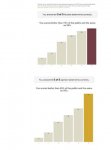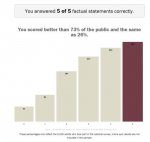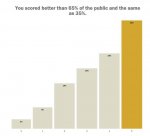I recently read an article on NPR that examined peoples ability to tell fact from fiction. The article included a quiz that I think would be interesting to test on these forms. The quiz can be found at:
Quiz: How well can you tell factual from opinion statements? | Pew Research Center
[
Warning: SPOILERS AHEAD]
.
.
.
.
.
.
Often polls like this are used to create propaganda, so I have listed the questions below and my answers, and if I get less than ten this poll is partisan.
1) Immigrants who are in the U.S. illegally are a very big problem for the country today.
I picked “factual statement” because it is a fact. If Pew says it is not a big problem this is a partisan poll.
2) Abortion should be legal in most cases
I picked “factual statement” because it should be legal in most cases. If Pew says it is only an opinion this is a partisan poll.
3) Democracy is the greatest form of government.
I picked “factual statement” because it is provably and demonstrably the greatest. As Winston Churchill said, Democracy is the worst form of Government except for all those other forms that have been tried from time to time…” If Pew says that is only an opinion, they’re wrong, and this is a partisan poll.
4) Spending on Social Security, Medicare, and Medicaid make up the largest portion of the U.S. federal budget
I picked “factual statement”. If Pew says that is only an opinion, this is a partisan poll.
5) Health care costs per person in the U.S. are the highest in the developed world
I picked “factual statement”. If Pew says that is only an opinion, this is a partisan poll.
6) Immigrants who are in the U.S. illegally have some rights under the Constitution.
I picked “factual statement”. If Pew says that is only an opinion, this is a partisan poll.
7) Government is almost always wasteful and inefficient.
I picked “factual statement”. Once again this is provably and demonstrably correct. If Pew says that is only an opinion, this is a partisan poll.
8) President Barack Obama was born in the United States.
I picked “factual statement”, but I will tweak that. It is a “factual statement” according to the U.S government. My own private opinion is that I don’t know whether it is a fact or not, but I’m not denying it.
9) ISIS lost a significant portion of its territory in Iraq and Syria in 2017.
I picked “factual statement”. If Pew says that is only an opinion this is a partisan poll.
10) Increasing the federal minimum wage to $15 an hour is essential for the health of the U.S. economy.
I picked “opinion statement”. In truth minimum wage legislation destroys jobs and makes people poorer. If Pew says number 10 is a fact, this is a partisan poll.
All the above was written before clicking ‘Get your results’. Here we go:
Ha! I knew it. They scored me down, saying I had four of the answers wrong. This is a
partisan quiz!
Here are their “corrections”
Democracy is the greatest form of government.
You answered Factual statement
The correct answer is Opinion statement
Incorrect. The correct answer is ‘Factual Statement’
Abortion should be legal in most cases.
You answered Factual statement
The correct answer is Opinion statement
Incorrect. The correct answer is ‘Factual Statement’
Immigrants who are in the U.S. illegally are a very big problem for the country today.
You answered Factual statement
The correct answer is Opinion statement
Incorrect. The correct answer is ‘Factual Statement’
Government is almost always wasteful and inefficient.
You answered Factual statement
The correct answer is Opinion statement
Incorrect. The correct answer is ‘Factual Statement’


